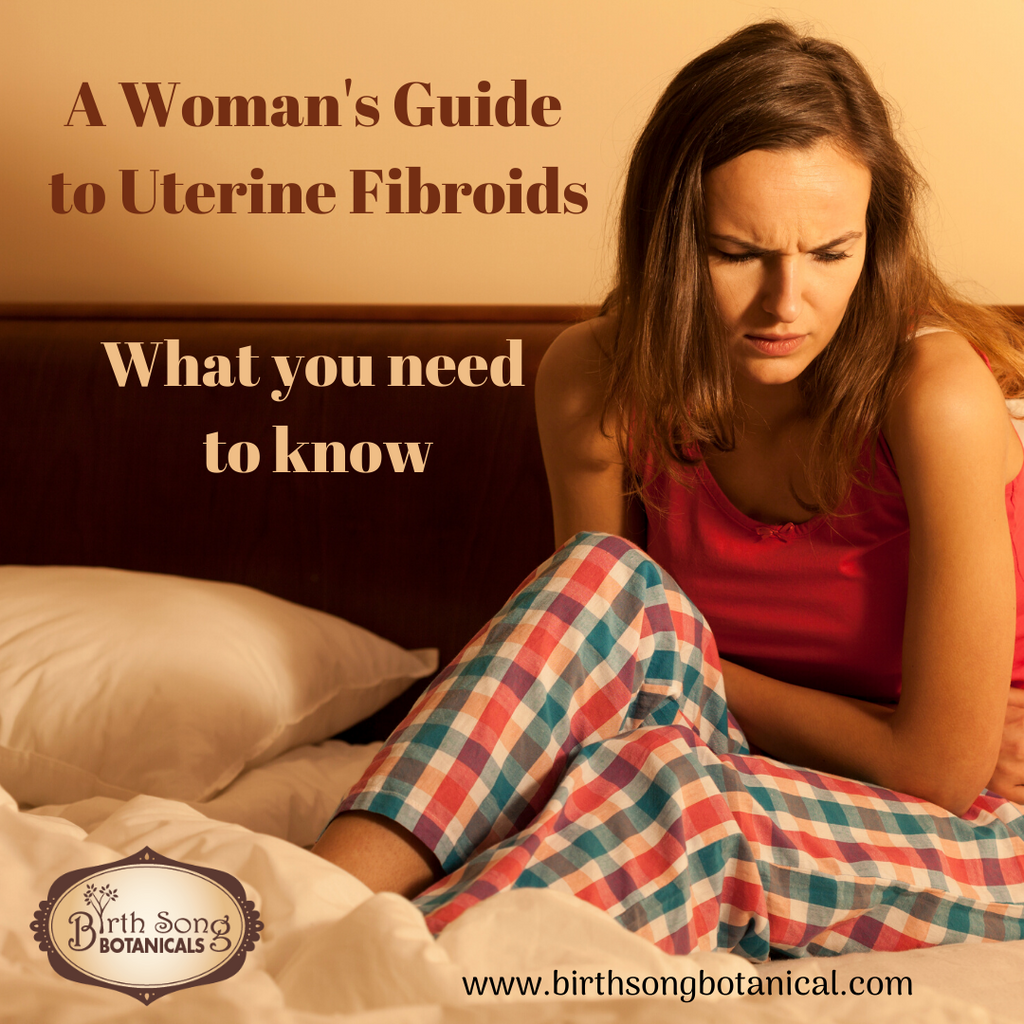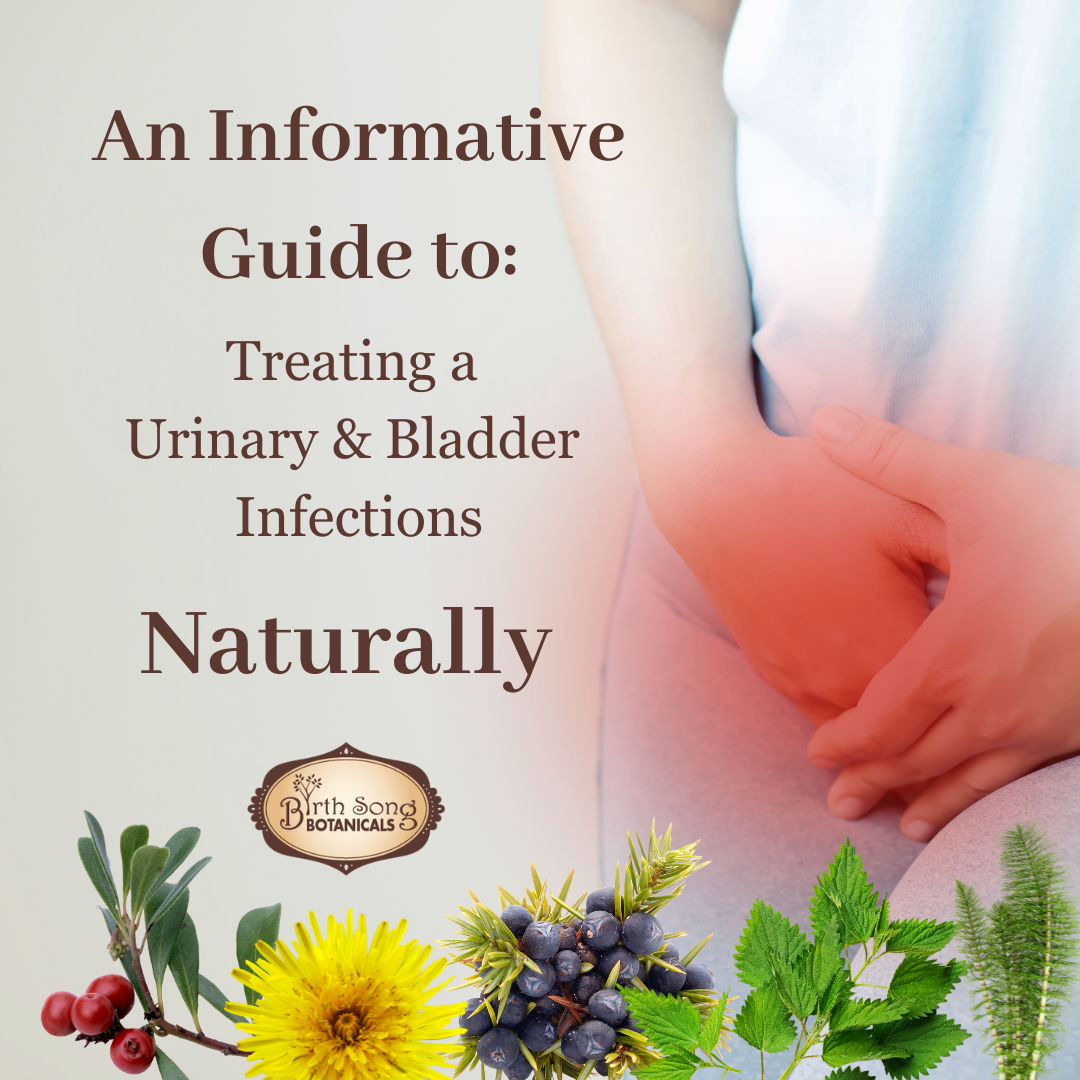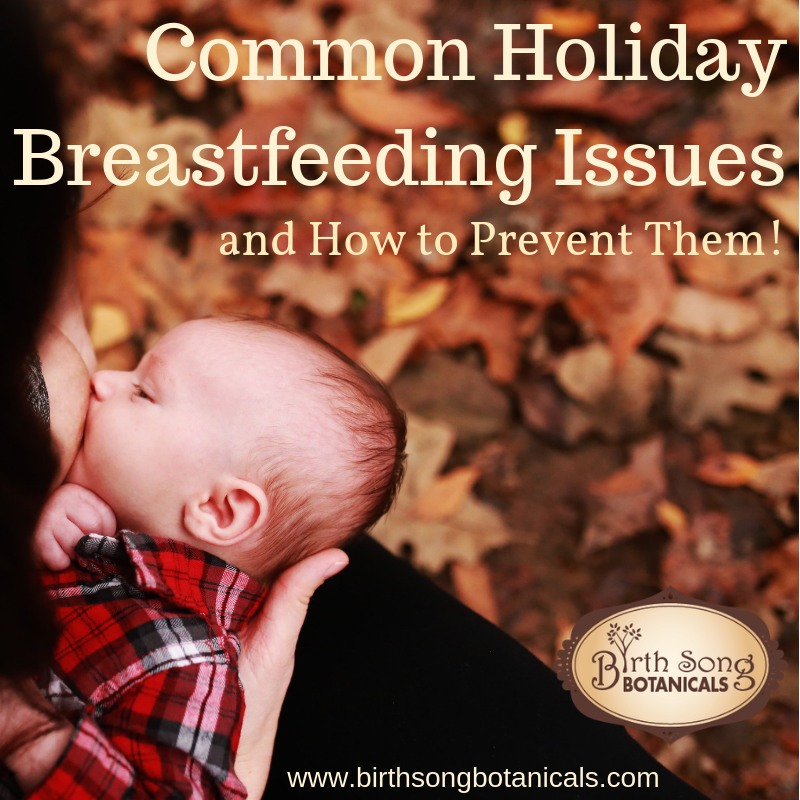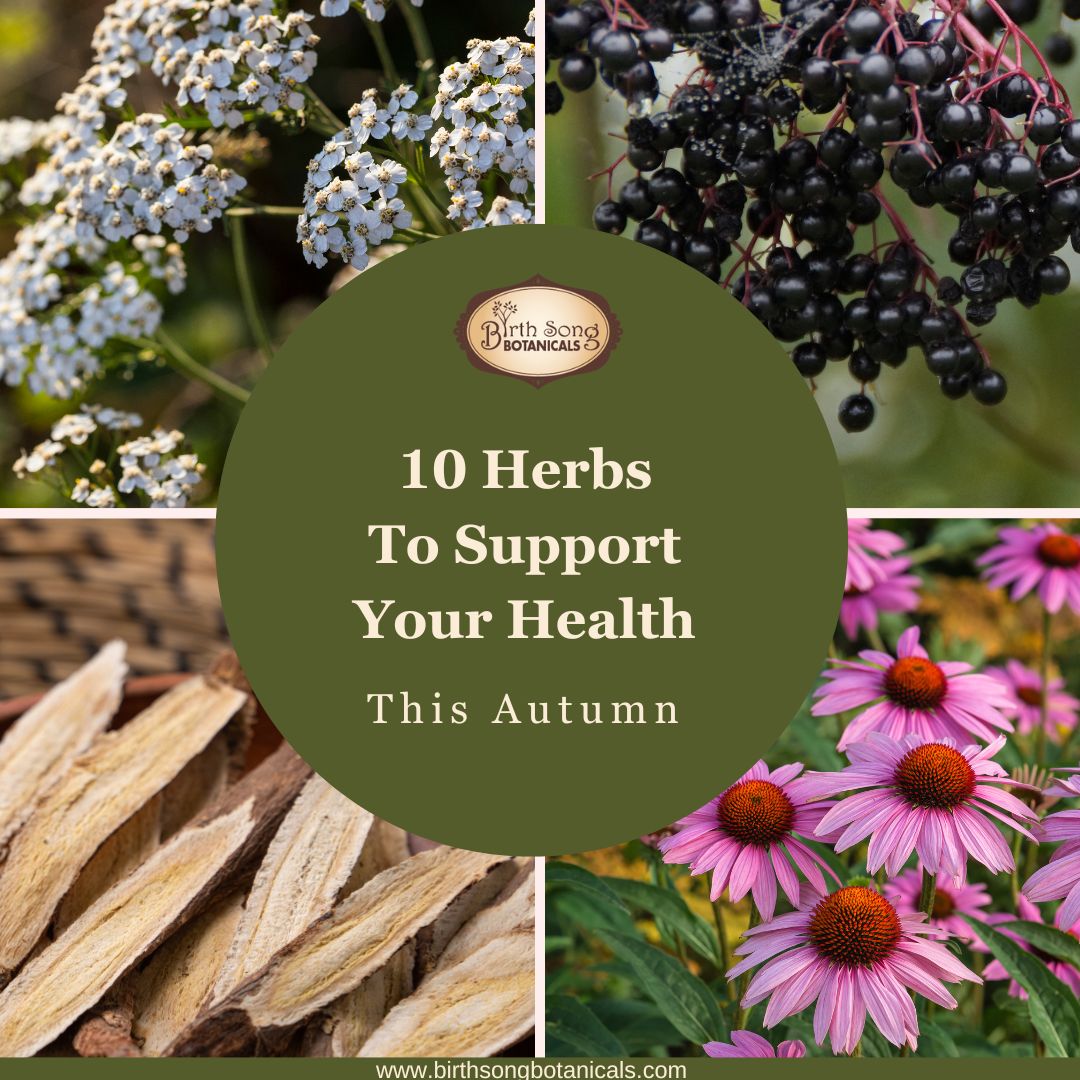A Woman's Guide to Uterine Fibroids

This week we had 3 questions about fibroids. Women are wanting to know how to detoxify their bodies, shrink fibroids, and stop bleeding so much. If you are one of the millions of women who have fibroids, you'll want to read this post.
Today we'll talk about uterine fibroids and what to do if you have them. When I look at my life's work when I distill it down to it's most pure form. I see that my role is to help preserve the sanctity and wholeness of women, too instill trust in our uteruses, womb spaces, body, blood, breath, and radiance.
If this is the first time we are meeting, my name is Maria Chowdhury. I'm a midwife, herbalist, and the owner creator of Birth Song Botanicals. We make nourishing herbal remedies for fertility, menstruation, pregnancy, birth, breastfeeding, and children's wellness. You can learn more about us, our products, blog, and youtube channel.
Listen on SoundCloud:
Watch On Youtube:
*This is a reminder that this and all my posts are for educational purposes and do not replace professional midwifery care. Please be safe and personally responsible.

Women have long been the care providers, midwives, nurses, herbalists, mothers. We have relied on our instincts and resilience to keep ourselves, our families, and communities healthy. Modern times are no different. Yet we have had an uphill struggle to keep our female body safe from over-medicalization and unnecessary surgery. Often, modern medicine is not able to address the origins of our illnesses, and many of the treatments are very helpful, and others are extreme and excessive. Radical medical techniques add additional stress to an already stressed out system. Stress will perpetuate any health problem and appears to be the underlying cause of abnormal growths. Avoid it whenever possible. Sure, surgery and chemo/radiation may become necessary; but they are not the first line of defense.
Overview
Just like how benign breast lumps develop with changing hormones, stress, sickness, so do ovarian cysts PCOS and Uterine Fibroids. We previously made a video and blog post about PCOS for you to refer back to. Today we are addressing Uterine Fibroids or Myomas.
As the condition of our lives changes so do the conditions of uterine fibroids. First and foremost, fibroids do not automatically signal cancer, and the vast majority of the time, they do not automatically need to be removed surgically or with radiation or chemotherapy. Often these approaches not only ineffectively address the problem they perpetuate it.
As you are watching this video today, know that you are in the right place if you don't want to be one of the estimated that 40-50% of American women that have their uterus removed by the age 65. You are in the right place if you think that number is horrific! Like all surgeries, hysterectomies are necessary at times but, these need be the exception and not the norm. Fortunately, with the advances of modern medicine, there are better, safer options and alternatives to hysterectomies. And there are a whole host of natural ways to keep your precious uterus healthy.

You are in the right place if you agree that our uteruses are an integral and vital part of our inner ecology. Sure we can live without a uterus. But from my perspective, it is worth protecting. It's our uniquely feminine organ and source of our superpower. It's where our creativity, fertility, and vital essence stem from. It's not just the organ of biological fertility, reproduction.
Of course, this is not a simple issue. There is not just one answer that fits everyone's unique life story. This is not a value judgment; the fact is that removing the uterus can save your life sometimes. Yet, what happens more often than not is that women don't have all the information, are afraid, and don't know what else to do. Since they don't have access to all the options, they have their uteruses removed for non-life-threatening situations. This is analogous to removing a jewel- the heart stone-of the center of the earth and replacing it with nothing! That is not something that should be taken lightly and without careful consideration.
If you find yourself in this situation, I encourage you to examine all other options and get a second and third opinion before surgery. If you find that for your longterm health must have a hysterectomy, then do it with gratitude. Sudden and surgical menopause is well supported by healthy eating, herbs, and life-affirming practices.
Most of the time, when a woman discovers she has benign growths in her vagina, ovaries, or uterus, there is still time to attempt to resolve them naturally with non-invasive therapies like nutrition and herbs. If the remedies do not have the desired outcome, and the fibroids continue to grow, then there is always the modern medical approach to treatment. I suppose there is the third option which I hesitate to recommend: do nothing and leave them alone until menopause. Fibroids have a way of growing and a way of resolving on their own.

Uterine Fibroids
A recent study from womanshealth.gov states that about 20 to 80 percent of women develop fibroids by the time they reach age 50.
Fibroids are benign tumors, generally solid in nature, that grow on the uterus. Small fibroids are usually asymptomatic. The word tumor means a swelling or a growth, not a malignancy, not cancer. Less than 0.1% of all uterine fibroids are malignant. Typically they are the size of walnuts, but they can grow really big. As they grow larger and/or more numerous, they may cause pain, bleeding between cycles, and excessive bleeding during menstruation leading to anemia and depletion. Large fibroids can also prevent conception and cause miscarriages. During pregnancy, they can cause the baby to be in a poor position and may lead to cesarean birth. The size and placement of the fibroids may influence the labor pattern, leading to Pitocin's induction and augmentation. This is rare, and the fibroid needs to be rather large to cause these disruptions with pregnancy and the birth process. In my professional experience of attending hundreds of home births, many women had fibroids, only one of them needed a c-section. There were no complications with the other women. They conceived, carried to term, and did not bleed too much.
The cause of fibroids is not fully understood. We do know that fibroids are dependent on estrogen for their growth. Estrogen treatments, oral contraceptives, and pregnancy stimulate their growth. Conditions where the estrogen level is increased, such as pregnancy and perimenopause—the year or two just before menopause—are associated with increased growth of fibroids. In contrast, fibroids usually shrink after menopause, when estrogen levels decline. Lowering estrogen levels in the body slows the growth of fibroids. Uterine fibroids still often shrink considerably or disappear entirely during and after menopause, when estrogen levels naturally decrease. Women with uterine fibroids are often estrogen dominant and have low progesterone levels. Stabilizing estrogen/progesterone levels can cause fibroids to shrink and dissolve altogether. This is likely due to progesterone's ability to help speed up the clearance of estrogens from the tissue.

Major Causes of Estrogen Dominance:
The major cause of estrogen dominance in our current society comes from the overuse of chemicals & preservatives. Xenoestrogens are artificially made compounds produced by industry. These differ chemically from archiestrogens (naturally occurring) produced by living organisms.
Xenoestrogens mimic the effects of true estrogen and interact with cellular receptor sites. This process contributes to estrogen excess and blocks the effects of true estrogen. To make matters worse, these endocrine disruptors lodge in fat cells where they are resistant to breakdown.
Many of these chemicals will act in a synergistic effect when combined with other endocrine disrupters. This synergistic process exponentially enhances their effects within the body, causing major problems at the cellular level.
Most Common Sources of Xenoestrogens:
- Commercially-Raised Animal Products:
- Plastics & Canned Goods (many have plastic lining)
- Personal Care Products (makeup, lotion, & perfumes)
- Oral Contraceptives
- Pharmaceutical medications
- Food Additives & preservatives
- Styrofoam products
- Laundry & Dishwashing detergents
- Household cleaners & air fresheners
- Pesticides & Herbicides

Common signs and symptoms of uterine fibroids:
- Heavy menstrual bleeding
- Menstrual periods lasting more than a week
- Pelvic pressure or pain
- Frequent urination
- Difficulty emptying the bladder
- Constipation
- Backache or leg pains

There are 3 general locations for fibroids:
The size and location of the fibroid are important. The vast majority of them are very small and do not negatively reproductive function. They occur predominantly in premenopausal women, and their growth appears to be hormone (estradiol, progesterone) dependent.
- Subserosal – on the outside surface of the uterus
- Intramural – within the muscular wall of the uterus
- Submucous – bulging into the uterine cavity
The only type that is supposed to have a large impact on reproductive function (unless they are large or numerous) is the submucous type that pushes into the uterine cavity.

Fibroids can reduce your fertility in these ways:
- Fibroids that change the shape of your cervix can affect the number of sperm able to enter the uterus.
- Fibroids that block the Fallopian tubes can make the journey of a fertilized egg to implantation difficult or impossible.
- Fibroids which change the shape of your uterus may decrease the number of places an embryo can successfully implant or reduce uterine space needed for embryo development.
- Fibroids that weaken the lining of the uterine cavity or decrease the blood supply to a growing embryo can cause miscarriage.
What is the Relationship Between Fibroids and Infertility?
Once a pregnancy is established, it is rare for myoma to interfere with its progress, and most proceed uncomplicated. However, a higher rate of cesarean section has been noted, and premature labor may result from very large myomata.

Fibroid Treatment
Uterine Fibroid Embolization – Nonsurgical
Embolization is an outpatient procedure. That has lower risks than hysterectomy. A small incision is made in the upper thigh. A tiny catheter is inserted through this incision and into the femoral artery. Using x-ray to guide and locate the arteries which supply blood to each fibroid. Microscopic inert particles are injected into the vessels, blocking blood supply that nourishes the fibroid. Without a blood supply, the fibroids begin to dwindle and shrink. Embolization resolves fibroids without surgery by starving them.
Myomectomy
The goal of myomectomy is to take out symptom-causing fibroids and reconstruct the uterus. Unlike a hysterectomy, which removes your entire uterus, a myomectomy removes only the fibroids and leaves your uterus.
Hysterectomy
If the fibroids are too large or the above options are not a good fit for the woman, the final choice is a hysterectomy.
These procedures are not the first place to start your fibroid journey. The best place to start is with your food.
Let Your Food Be Your Medicine
A component to reducing fibroids is to lower estrogen levels, but you may be unknowingly receiving estrogen from the foods you eat.
For example, as I mentioned earlier, some produce is sprayed with environmental estrogens, like xenoestrogens; which is why eating organic fruits and vegetables is almost always a better option. Eating foods that do not contain any estrogen may help by limiting the size of fibroids, preventing further growth, and decreasing symptoms.
Get Energizing Chlorophyll if you're anemic from bleeding to heavy and to detoxify your body.
You also want to eat foods that support the liver. As with most conditions linked to hormones, any preventative measures you take on your own should focus on helping your body efficiently get rid of excess toxins through the liver and support detoxification of the body.

Healthy Foods to Reduce Fibroids
Consider adding these foods to your anti-estrogen diet plan:
● Cruciferous vegetables help the liver detox. Broccoli, cabbage, bok choy, kale, turnips, watercress, radish, and arugula are all great choices. Avoid overcooking these vegetables so that they retain most of their nutrients.
● Foods to help detoxify your body are. Garlic, carrots, beets, and drinking plenty of water will help with detoxification.
● Foods that contain carotenes should be added to your diet. Apricots, sweet potato, cantaloupe, carrots, pumpkin, and spinach.
● Eat foods containing vitamin E, like almonds, wheat germ, hazelnuts, and cod liver oil.
● Natural anti-inflammatory foods: Pineapple and fresh rosemary
● An antioxidant called polyphenol, which is found in green tea, can help to counteract the effects of estrogen.
● Consider taking a multivitamin every day. Look for one that has 100% daily value for vitamins: B1 (thiamin), B2 (riboflavin), B3 (niacin), B12, and B6. Vitamins C, D, E, and folic acid should also be included, as well as a max of 15,000 IUs of beta-carotene (vitamin A).
Foods To Avoid For Fibroids
These foods should be eliminated from your diet to help regulate estrogen levels in your body:
● If possible, any foods that increase estrogen levels in your body should be avoided. Red meat, alcohol, animal fats, cheese, cream, butter, ice cream, and chocolate have all been shown to raise levels of estrogen.
● Low-fat milk should be swapped for whole milk.
● Artificial sweeteners should also be eliminated; remember to read the ingredient list on the food label.
● Soya products have been shown to increase estrogen levels, so cut these out as well.
● Avoid storing food in plastic containers. Studies have shown that plastic can leech into the food from the containers, which will influence estrogen levels in your body when consumed.

*Please note: Lowering estrogen levels solely through diet does not and will not cure a fibroid condition. No promises- just full of potential!
Lifestyle and Exercise:
Exercise encourages weight reduction, improves pelvic circulation, and promotes uterine muscular tone. Yoga postures, vigorous walking, hip circling, pelvic thrusts, and belly dancing can all be useful to improve pelvic circulation. One study has suggested that physical activity was associated with a substantial decrease in the risk of fibroid development. Qigong practices that involve breath work directed to the lower abdominal area as well as hip circles, increase qi circulation and improve overall female reproductive health.
Stress Reduction:
Stress reduction and the role of the HPA axis should not be overlooked as part of the treatment protocol for women with symptomatic fibroids, as chronic uterine bleeding can cause emotional, social, financial, and medical consequences.
I know this is not hard science it's energy medicine, but consider the "sacral chakra" (is the 2nd energy center in the body, which includes the uterus) said to store our sensuality, sex, choice, creativity, and safety. It is believed that any unwanted growths in these organs can be countered by allowing these to be safely expressed.

Ask someone to burn moxa over the area of the fibroid while you envision the heat releasing the treasures in your uterus. What is locked up in this fibroid? What can you give birth to?
To support your journey and help you relax. I recorded a guided meditation for you to lovingly cleanse and clear the energy of your pelvis and to bless your body.
Botanicals For Fibroids:
Get your bottle of Cycle Relief Tincture now if you'd like to stop cramping and bleeding so much.
Green tea extract: In some research, women with uterine fibroids taking green tea extract had reduced fibroid volume compared to placebo controls. Green tea extract treatment was also associated with a reduction in symptom severity, including anemia.
Black cohosh: Black cohosh was historically used by the Eclectic physicians for the treatment of what were presumably fibroids, with dragging pain in the uterus, back pain.

Vitex (chaste berry): Chaste berry is the primary herb employed by herbalists and integrative medicine practitioners for hormonal modulation in the botanical treatment of fibroids. It acts as a dopamine agonist, resulting in a reduction in prolactin release. Prolactin may play a role in fibroid growth. No scientific evidence in the literature has been found for the use of chaste berry specifically in the treatment of fibroids, and although its use may result in the reduction of apparent estrogen excess due to relative progesterone deficiency, increased progesterone levels have been shown to result in an increased mitotic division in fibroid tissue.
Yarrow: Because bleeding is a common symptom of uterine fibroids, numerous antihemorrhagic herbs are used in botanical medicine protocols. Yarrow dried plant infusion is perhaps one of the most widely used uterine antihemorrhagics, reliably reducing acute uterine bleeding, but conversely promoting menstrual flow when suppressed. It has been used since ancient times as a styptic. Either dry or fresh plant can be used as a tea or tincture. Many herbalists believe that yarrow herb taken as tea is more quickly effective for stopping acute uterine bleeding than other preparations.
Shepherd's purse: Shepherd's purse (fresh only) has been used traditionally as a uterine antihemorrhagic. Extracts of shepherd's purse have a hemostyptic action, l Many modern Western herbalists believe that it is imperative to prepare Shepherd's purse from fresh, not dry, plant material.

Raspberry Leaf: Red raspberry leaf is typically used more as a long-term uterine tonic than to arrest acute bleeding.
Ginger and Cinnamon: Ginger and cinnamon are both traditionally used to increase circulation to the reproductive organs. Further, cinnamon has been used historically to reduce uterine bleeding, making it specific for the treatment of uterine fibroids with menorrhagia or metrorrhagia, and recent research has confirmed its benefits in both dysmenorrhea and menorrhagia.
Get your bag of Women's Balance Tea to help support your HPA Axis and balance your hormones.
- Warm castor oil packs on the belly, or ginger compresses (soak a towel in hot ginger water) relieve pain and help shrink the fibroids.
- Strengthening the liver with herbs such as dandelion, milk thistle seed, or yellow dock root helps it metabolize estrogen out of the body, thus reducing fibroids.
- Estrogen promoting herbs such as wild yam and red clover should be avoided.
Thank you for spending the time with me today and learning more about fibroids and woman's uterine health. It takes daily diligence to keep ourselves healthy. Remember it's the little things that make a big difference. Please share this post with the other women in your life. We all need to support each other to keep our community healthy and vibrant.
I'd like to extend an invitation to you, you are more than welcomed to practice Qigong with me as you recover or any time for that matter. Classes are live via Zoom. Every Friday morning at 10 am central time.
To sign up go to www.pathwithharmony.com
Did you know you can watch our Live videos every Thursday at 12 central time on our Birth Song Botanicals Facebook page?
Until next time my friends, drink deep and always walk in beauty!
Hugs,
Maria
Remember to:
Like our Birth Song Botanicals Facebook Page
Follow Birth Song Botanicals Co. on Instagram
Read our Birth Song Botanicals Blog
Watch Birth Song Botanicals on Youtube
Listen to Birth Song Botanicals on SoundCloud
Be inspired by Birth Song Botanicals on Pinterest
References:
Herbal Healing for Women, Rosemary Gladstar-pages, 37, 120 Uterine Fibroids 158, 159, 160-62, 165
Major Causes of Estrogen Dominance: https://drjockers.com/uterine-fibroids/
Fibroid Medical Treatment © 2020 The Fibroid Treatment Collective.
Aviva Romm © 2017 AVIVA ROMM, MD
Sususn Weed
https://fibroids.com/embolization/







